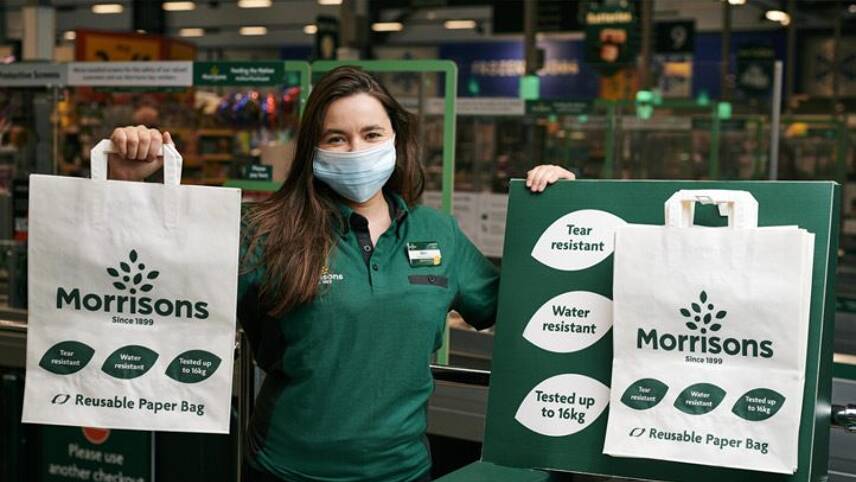Register for free and continue reading
Join our growing army of changemakers and get unlimited access to our premium content

The paper bags cost the same as the plastic 'bags for life' and boast similar strength and capacity. Image: Morrisons
The supermarket has today (17 August) removed plastic ‘bags for life’ from eight of its stores, replacing them with reusable white paper bags which retail at the same price point of 30p. Customers will also be able to choose any of Morrisons’ existing range of plastic-free reusable bags, which are more expensive.
Morrisons claims that its reusable paper bags have a similar capacity to its standard plastic ‘bags for life’ and are strong enough to carry up to 16kg at a time. They are also recyclable by all UK local authorities at kerbside.
Should the trial, which will run for 12 weeks, prove successful, Morrisons will develop plans to remove plastic ‘bags for life’ from all 494 of its UK stores, in a move it claims would prevent the use of 90 million bags – collectively weighing 3,510 tonnes – from being distributed annually.
“We believe customers are ready to stop using plastic carrier bags as they want to reduce the amount of plastic they have in their lives and keep it out of the environment,” Morrisons’ chief executive David Potts said. He highlighted the fact that the supermarket is using 100% PEFC-certified material to produce paper bags, in a drive to minimise unintended environmental consequences.
Morrisons is already offering smaller reusable paper bags as an alternative to 5p single-use carrier bags, having introduced them to all stores late last year following successful trials. One in three customers who do not bring a bag with them now opt for these bags instead of traditional plastic ‘bags for life’.
The UK government has repeatedly claimed that its decision to introduce a 10p charge for ‘bags for life’ and mandate large retailers to remove single-use bags has reduced plastics littering and pollution. According to one study for the journal Science of the Total Environment, 30% less plastic bags were found on seabeds around Europe in 2018 than in 2010, largely due to new legislation in Ireland and Denmark as well as the UK.
However, Greenpeace and the Environmental Investigation Agency recorded a 26% surge in ‘bags for life’ sales between 2017 and 2019, arguing that the bags were increasing the plastics waste footprint of supermarkets.
Three cheers for plastic-free beers
In related news, Heineken UK has restarted the rollout of plastic-free alternatives to flexible plastic rings for its multipacks, due to begin in April, after Covid-19-related delays. The new topper, called Green Grip, is made using sustainably-certified cardboard and is both recyclable and compostable.
By switching to this format, the brewer estimates that it will mitigate the use of 517 tonnes of plastic annually throughout its supply chain. It has invested £22m in new manufacturing machines, processes and materials.
Heineken UK claims it is on track to meet its aim of removing plastic packaging from all multipacks by 2021.
“Introducing a brand new technology is challenging at the best of times, but doing so at a time of social distancing measures and when we’ve adapted our operations to meet heightened supermarket demand is a testament to the adaptability and determination of our brewery and project teams,” Heineken UK’s brewing and operations director Matt Callan said.
“We continue to look at further options to eliminate single-use plastic, including in our logistics and distribution network as we remain committed to eliminating unnecessary plastic in our total supply chain.”
Elsewhere in the beverage sector, Diageo and Budweiser are shifting to cardboard boxes and sleeves, while Corona is trialling cans that screw together and Carlsberg is using a recyclable glue.
Sarah George


Please login or Register to leave a comment.